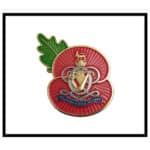John Downes was commissioned into The 4th Queen’s Own Hussars in June 1941 and served with the Regiment in the Middle East and Italy from 1942 to 1945.
He was a man of high intelligence, good humour and great courage, who had the knack of getting on well with all ranks and successfully applying his formidable talents to a great variety of tasks.
He had a natural gift for command and applied it in an agreeably persuasive manner. Yet at times of danger and crisis, he showed a cool and determined devotion to duty and commitment to those under his command that ensured a general admiration for his leadership and grasp of events.
Had he not decided to leave the Regular Army at the time of The 4th Queen’s Own Hussars’ amalgamation with the 8th Hussars, he would undoubtedly have reached high rank.
On leaving, however, he again showed his versatility and drive by pursuing a most successful career with the Charterhouse Group. He was twice married, first to Anne Elliot-Deacon, by whom he had a daughter, and after this marriage was dissolved in 1955, to Patricia Tickell. During the last few years of his life, he greatly enjoyed being with his old 4th Hussar comrades at their annual dinner.
John Downes was born in 1918 and educated at King Edward’s, Birmingham, the University of Birmingham and Christ’s College, Cambridge. After his finals in history, he joined the Army, and after being commissioned, began his service with the 4th Queen’s Own Hussars in January 1942 as a troop leader in the Western Desert.
During the battle of Alam el Halfa, he greatly distinguished himself by his courage and leadership. In a fierce action near Hemeimat, his troop engaged enemy anti-tank guns and tanks and sealed off a minefield gap. During the action, when one of his tanks was hit by enemy fire and its driver killed, he went forward and drove the tank back under cover. He was awarded an immediate Military Cross.
After the battle of El Alamein and subsequent actions, The 4th Queen’s Own Hussars were withdrawn for reinforcements and reequipment, and following a few months in Cyprus, the Regiment returned to Egypt for further training with Sherman and Stuart tanks as an armoured reconnaissance regiment.
John Downes became Adjutant at this time and remained so for the subsequent battles in Italy in 1944 and 1945. He was an excellent Adjutant and during the hard-fought battles of the Gothic Line was often to be seen well up at the front with the leading squadrons.
From 1945 he was appointed to a number of staff jobs, including one at HQ Middle East Land Forces and with the Arab Legion from 1947 to 1950, during which he was both Brigade Major and Lieutenant Colonel GSO1. He was further decorated with the MBE, the Hashemite Order of Intakal and the Trans-Jordan War Medal.
It was characteristic of John Downes that when The 4th Queen’s Own Hussars were on their way by troopship to Malaya and were for a short period at anchor in Port Said, he made the journey from Jordan to spend a few hours with his old wartime comrades. In 1950 he rejoined The 4th Queen’s Own Hussars, still in Malaya and Hong Kong, and was a most popular and successful squadron leader.
After returning from Malaya, he served on the staff of the 7th Armoured Division in BAOR, again rejoining the Regiment stationed nearby at Hohne in 1954.
He again commanded a squadron with distinction, until in 1956 he became 2IC of The 4th Queen’s Own Hussars’ affiliated Territorial regiment, the Shropshire Yeomanry. This was an appointment that he immensely enjoyed, an enjoyment enthusiastically shared by the Shropshire Yeomanry, who wanted John Downes as their Commanding Officer in 1961.
At this time his business commitments were too heavy. He continued service with the Yeomanry and on the staff of the 53rd Welsh Division TA until 1967, retiring as a Brevet Colonel.
Col Downes died in October 1997 and was deeply mourned by all his military and other friends.
Although belated, we offer our most sincere sympathy to his family. He was again remembered at the 4th Hussars’ dinner in April 1998 at which many of his old comrades were present. They honoured the memory of a man whose integrity, devotion to duty and service, courage, good nature and versatility persevere as a model for all of us.



